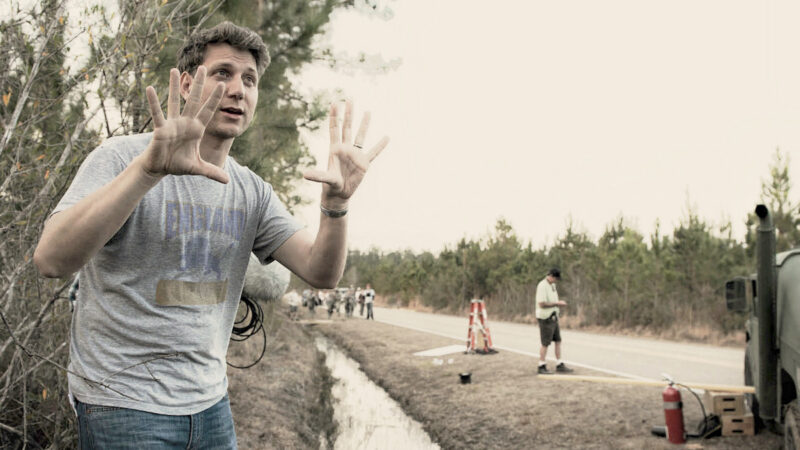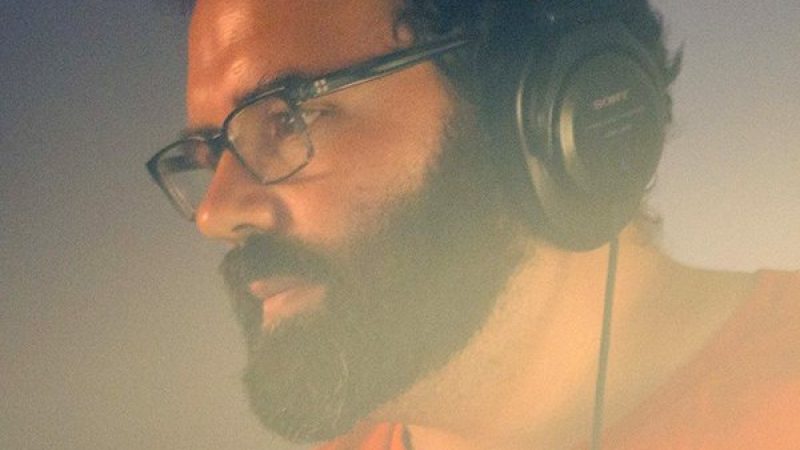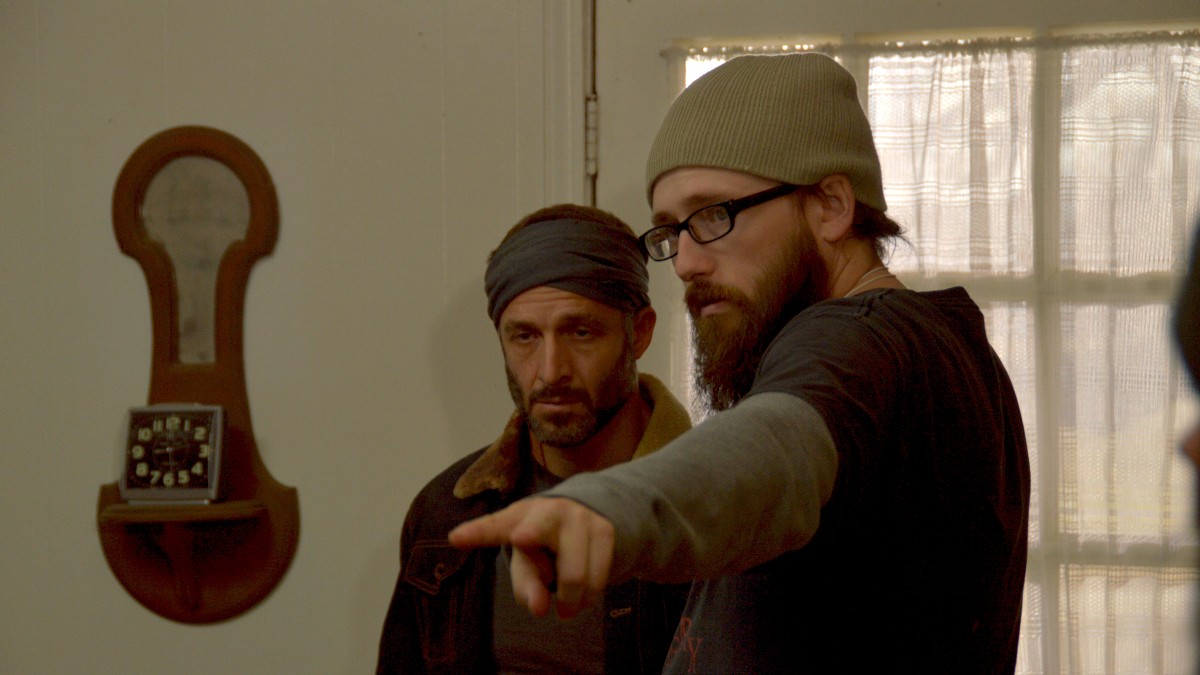
Derek Presley was born in Fort Worth, Texas. Child of the 80s and 90s and lover of cinema and literature. I started making films at 12 years old with my mom’s 8mm video camera. During my teen years, I idolized filmmakers like Tarantino, John Woo, Martin Scorsese. I discovered Terry Gilliam and Jean Pierre-Jeunet and immediately fell in love with oddball fantasies. In my 20s I began making narrative short films. I had a screenplay optioned at 25 years old but it was never filmed. At 30 I shot my first feature film entitled CRONUS along with a slew of short films that had various degrees of success at festivals.
While I had mostly been creating genre stories consisting of Science-fiction, fantasy, and horror (like my idols Gilliam, Fellini, and Jeunet), I decided at 35 to give in and write something more raw as well as something where the characters were at the forefront instead of set design or effects. I wrote WHITETAIL and was lucky enough to find my current collaborators and friends. We created Muscular Puppy and within a year and a half we’ve made three features and all three are heading into distribution this Fall/Winter. Each feature film has grown in size and budget and we hope to keep it up.
The Official Trailer for WHITETAIL written and directed by Derek Presley
indieactivity: how would you describe your work as a director?
Derek Presley (DP): It’s changed over the years. At first, I was almost entirely caught up with the visual aspects. Compositions of shots, movements, and the set design, color schemes. I think I was on the right track but I neglected a very precious element that I have now let fully envelop me – the actors. As clumsy and ignorant as that may make me seem, it’s what I feel in my gut. I’m extremely methodical with the visuals. I storyboard nearly every frame (whether we use it or not) and I try to give the film a tone with color or simply a rule I implement so the entire picture has some form of individuality. But now I’m trying to hone my skills as a director’s actor. I just feel all else pales in comparison to the performances. They are what the audience identifies with. They have to be amazing
I’m collaborative with every department and I like to keep things moving and at least attempt to have a positive vibe on set. I try not to take it too seriously because truth be told…we’re lucky to do this and lucky to breathe. So have fun but try to make the best film possible.
How did you get into directing?
Derek Presley (DP): I think it was when I first turned on my mom’s video camera. This was 1995 or so. I was sucked in at first by simply recording and watching and I was, of course, the star of my own little projects so possibly was wanting to act. But that vanished very quickly when I realized I couldn’t stand being in front of people. So it was then special effects and particularly stop motion animation. I figured I would be like the guys I worshipped as Dykstra and anyone on the Empire Strikes Back crew. And then I realized I didn’t have the patience and I really wanted to write and direct. The idea to write and direct came from the library. I went there and found a book called Film Director I believe by Robert Wise and it broke down the role. I was hooked ever since.

How do you choose a project to direct?
Derek Presley (DP): Well I’ve been lucky to only direct my scripts so far. What I considered about writing and then directing Whitetail was really where I was in life. I had stepped away from filmmaking because to be completely honest I hadn’t had a successful venture up to that point. I couldn’t quite grasp what it was that was missing but after I decided to do one more film, it needed to be raw, contained, cheaper, and absolutely unapologetic. I kind of restarted my career by utilizing what I’d learned as well as utilizing what I failed at.
Do you ever take courses to increase your craft?
Derek Presley (DP): No, I have not. I’ve read just about every book there is (back in the 90s) and have spent way too much time at Barnes N’ Noble, Half-Price Books, and libraries reading Moviemaker Magazine, Filmmaker Magazine, and Creative Screenwriting Magazine. The rest was just creating my own films. Failing. Repeating. Failing again. And just keep going until hopefully, you get it right. But who knows?
What books do you read?
Derek Presley (DP): For filmmaking, I read tons of biographies: Terry Gilliam, John Woo, Alfred Hitchcock, David Cronenberg, Sidney Lumet, Fellini, and Kubrick, but the list goes on and on. For pure enjoyment, I love Joe Lansdale, Neil Gaiman, Mark Twain, Dickens, and Elmore Leonard. I can’t specify every book but I can state the book that I love most from each author. Lansdale – The Bottoms. Gaiman – Neverwhere. Twain – A Connecticut Yankee in King Arthur’s Court. Dickens – A Tale of Two Cities. Leonard – Get Shorty.
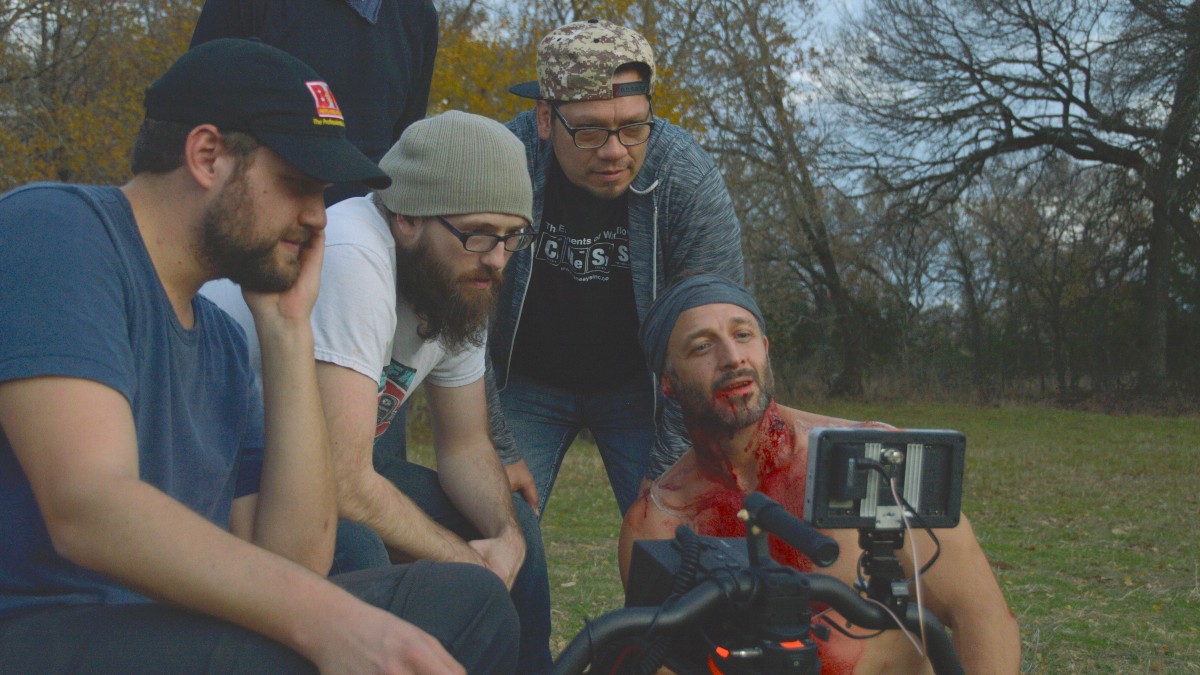
How do you choose an actor, writer, or producer for a project? Is there anything specific you look for?
Derek Presley (DP): For actors, it’s a personal connection. On Whitetail I used these amazing actors I’d been lucky enough to work with before and they were all doing something different as well. They were genre actors. Paul T. Taylor, Tom Zembrod, and Billy Blair were in a vast amount of Horror films and they’re all so unique and talented. I would say if they can lose me during their audition video, meaning if they take me out of that moment of being a director watching a performance, and I just watch them because I can’t take my eyes off them…then that’s definitely someone I want to work with.
My producers have been a group of guys that I’m close with now for three films. Jason Starne, Austin Williams, Stephen Endelman, and Tom Zembrod. These guys just roll their sleeves up and make things happen. That’s what you want in a producer. You also want someone who isn’t afraid to tell you, as the director, you’re making a mistake or at the very least has the nerve to argue, discuss things and stand up for what they want. Oh, and I also want a producer who will take ownership of the film. So many times you hear of producers that look at the film as the Director’s baby. While it’s my movie, I also want to have joint ownership and want the people who bust their ass to know it’s their film as well.
When you are offered a project, what things do you put in place to deliver a good job?
Derek Presley (DP): Immediately a look-book. A short booklet that will convey what I want visually, tone, feel…etc. I storyboard and then my discussions start right away with the cinematographer. In a lot of ways storyboarding is like the last draft of a script. Sometimes I move too fast and begin to storyboard a film we don’t end up making. But I do it because I love the process and I write with the images in mind. So, I definitely try to make a blueprint for the film before anything else. Establish what this film will look like, smell like, feel like and sound like.
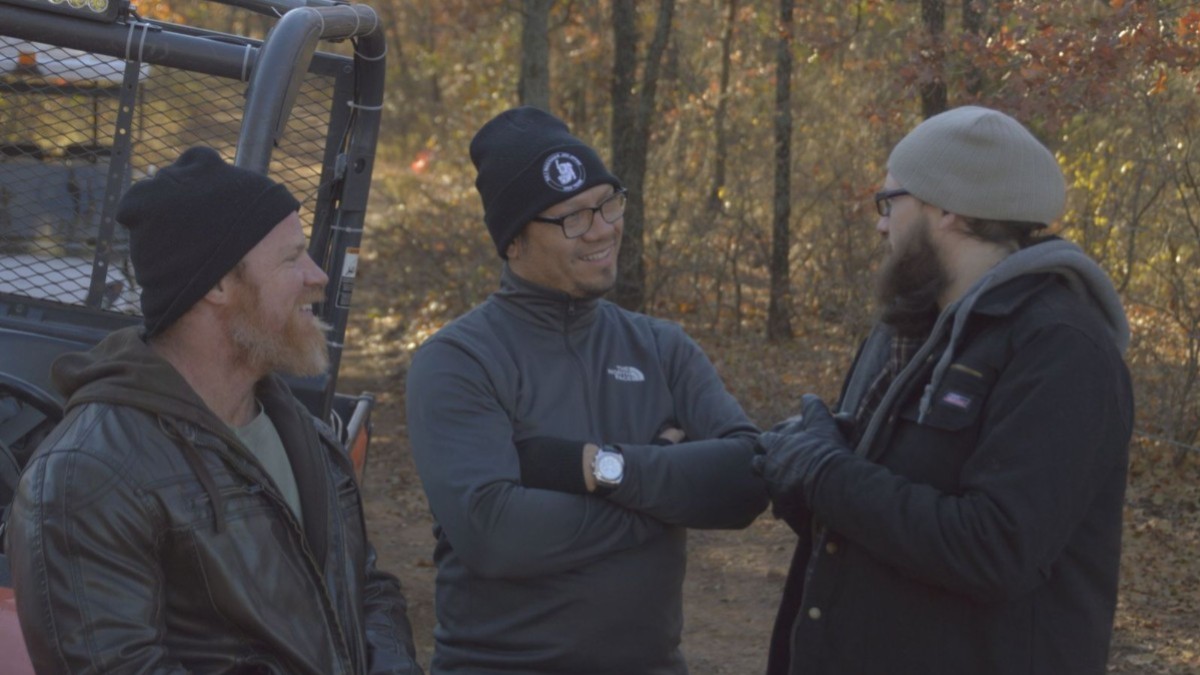
How did you come to form Muscular Puppy and what is your relationship like with the fellow founders and your producers?
Derek Presley (DP): When I finished the final draft of Whitetail, I sent it to Garrett Schwindt, who I had known for a while but had never worked with. I loved his reel and after countless conversations with him I knew we were on the same page visually but what was great was we each had our own influences and I believe we even enlightened each other. So he sent the script to another gentleman he knew named Alex Blackmon. Alex mentioned investing only a portion but ended up enjoying the script and wanted to start a new venture in producing so he invested about 90% of the film in February of 2019. I then went to Tom Zembrod who had been an actor in my previous movies as well as producer and he introduced me to Austin Williams.
With Austin, Garrett, and myself we were planning throughout the Summer (waiting for Winter to roll around) and in about July I had lunch with Jason Starne, who I’d known and had worked with as well in the past. Starne really wanted to get involved as the producer but he filled about ten positions, as had Tom Zembrod and Austin Williams. After filming we really grew fond of each other and I believe Garrett mentioned we should start an independent film company. We did. And we gave it a really funny name.
You seem to focus a lot on southern and western settings, the genre of Whitetail is a “Southern Gothic Horror/Thriller”. Can you explain why you are drawn to these settings and what the genre is? Is there anything unique about the stories within the genre?
DP: Well that goes back to how I mentioned I changed my approach. Genre. Style. Writing. When I was younger and I’d read an interview with an established writer, he or she would always say “Write what you know.” I never understood that. I idolized the storytellers who, on the outside, wrote extremely weird stories that I thought they couldn’t possibly “know”. As I got older, I realized what those established writers were actually saying. They didn’t mean you couldn’t write sci/fi, horror, or action, just because you didn’t “inherently know it”. They were saying put a piece of yourself in everything you write. I’m from Texas. I grew up with my biological father watching Maverick, The Rifleman, Bonanza on T.V. and nearly every western film imaginable. I love Night of the Hunter. Joe Lansdale. I love darker elements of life and I simply feel like I know it. Unfortunately, I also know all too well what tragedy feels like and I know people can come out of tragedy to be much stronger than they were before.
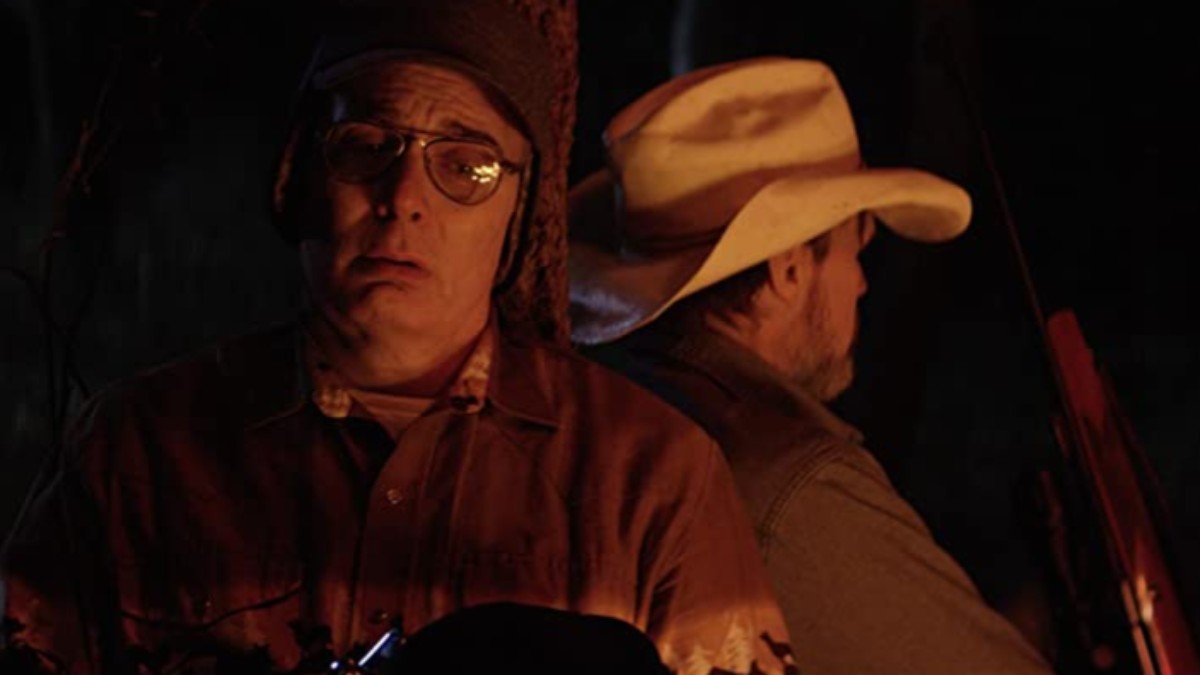
So these first three films definitely have a part of me in them. With Whitetail, I grew up going to Brownwood/Cross Plains, Texas near Abilene. These are flat, dusty, hot, and dirty landscapes. Trees are small. Grass is brown. The house that was on the land was old and smelled of whiskey and burnt eggs. The camper was where we’d stay while we hunted. The inside reeked of mildew. The atmosphere was so full of character and I just wanted to show that on-screen. I have also used some family members for inspiration for the characters. The reason I believe it’s important to say Southern Gothic is because this film isn’t just a thriller, it’s a tad off. There’s something a bit surreal about it in the way we shot it, the way the actors portray their characters, and the score, that is just a tad different. And for me, that’s what Southern Gothic is.
Can you explain the key challenges in your film Whitetail?
DP: Biggest challenge was the budget and schedule. Around 100K and a tight 12 days during winter out in the middle of the sticks. Anyone from Texas knows the weather is bipolar and it’d go from 50 to 25 and up to 70 in one day. Kept us on our toes. Our crew was just awesome. Only about 15 to 20 people were wearing multiple hats. The actors were a huge part of us staying on time because there was never a moment that any of them froze or forgot lines. It was a well-oiled machine.
Explain a creative choice you took on the set of Whitetail?
DP: My favorite was a completely collaborative effort and that is why I love filmmaking. There is a scene where the three protagonists come upon a criminal in the farmhouse. Originally, the baddie with the gun interrogates them in the living room and walks up and down the line of men as if he were a drill sergeant. But we’d been in the tiny farmhouse for a bit and a few previous scenes were already in the living room. I didn’t want to neglect the rest of the house. Also, Billy Blair and the rest of the cast felt it was lacking something. They wanted to stretch their muscles, so to speak. So I opted for them to sit down at the dinner table while this baddie (played by Billy Blair) partakes in a can of beanie-weenies. To force the family to sit with him while he is so sinister is gut-wrenching. Then the question was now that we threw away those storyboards for the day, what and how do we shoot it. Garrett is a film scholar.
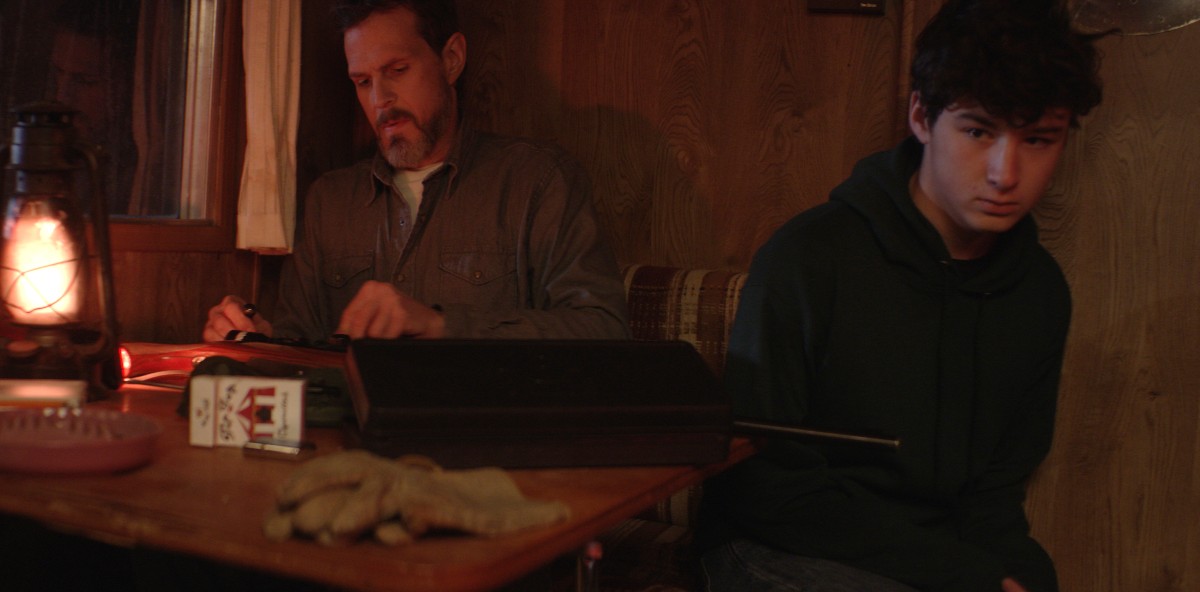
The man simply knows great cinema and he is extremely methodical in his approach. He doesn’t just say “it’s a cool shot”. He also knows how to connect images because he’s directed and edited so it’s never just one shot. He looks at the scene as a whole. So Garrett tells me how this Japanese filmmaker from the 1930s named Yasujiro Ozu would frame his actors and be incredibly symmetrical and even have them look into the camera. That was novel at the time he made his films. So Garrett and I worked out that we’d only film each member at the table in a single, symmetrical, nearly looking into the camera and the entire scene stood out in a great way. Not ever seeing what the others are doing at the very moment…only being with the character presented to you, is eerie and a little unnerving. It’s my favorite moment in the film.
Do you have any advice for fellow independent directors on how to find projects?
DP: If I were to give advice on “finding projects” I’d be incredibly ignorant of the requirements. I’ve only made my own scripts. But if I were to give advice to writers/directors, it’d be to use what you have and make something you want to see. The technology these days is just baffling. There’s really no excuse for someone to not make a film if that’s what they want to do. Just grab a camera and go. Maybe your first project is amazing and you’re the next Spielberg. Maybe you start at 12 and at 38 years old you’re just making a few features…but whatever you do, just create.
How can filmmakers finance their projects?
DP: There are a number of ways and unfortunately no one knows the best route. Private investors are out there. Crowd-funding. Saving your money. Wracking up credit. Pitching to a production company. These are all the ones everyone knows and anyone who’s been trying to get money for films will read these and say “well no shit.” But these are the ways I’ve done it in the past.
How do you prefer to work with a producer during a production?
DP: Jason Starne, Alex Blackmon, Austin Williams, Tom Zembrod and Stephen Endelman have all been my producers on three features. They all bring something absolutely unique to the projects. I am absolutely collaborative. Producers are my business partners and my collaborators. Jason is also a post-production genius, so he brings all of that to the table, which has saved us many times. Alex had the faith and understanding to get all of us going. Austin is a logistical genius who doesn’t know the definition of “no”. He will always get a “yes”. Endelman is a veteran of the Hollywood filmmaking system and a man who knows how to get deals done. I talk to each of the two to three times a day while making a project. They’re also just amazing people with big hearts.
Who is your favorite director and why?
DP: Oh…It used to be Terry Gilliam. I loved how he built worlds when he made films. When you watch his work you’re not on Earth or in the present. You were always transported. Each of his films was incredibly original and you could always just take one frame and it’d be a painting. Jean Pierre-Jeunet with Delicatessen and City of Lost Children. Fellini. Eastwood. But as I get older I appreciate the work of new directors like David Lowry, the Safdie brothers and I love Jennifer Kent. Her work is stunning and something to look up to. Lynn Ramsay too. Just too damn good. But if I had to say one I’d stay with Terry Gilliam.
What advice would you give directors around the world?
DP: I don’t know if I have any. My favorite directors come from around the world, so I think it’s only fair if they give me advice. They’ve clearly established themselves. But one thing I’d like is to see movies made in countries I know nothing about. I love to see a film that is made from a country I’ve never been to nor know anything about and what’s often so cool is, the stories are always very similar because I don’t know that as humans we’re all that different. So, different countries, different languages, different cultures but characters and their issues…sometimes the same. Pretty awesome. So make more films. That’s what I would say. Make more films for myself and other people who know little to nothing about your culture.
Briefly write about your career?
DP: My career, for lack of a better word, has been a roller-coaster. Ups and downs. Right now on an up. My first real film was a low-budget fantasy film entitled The Wayside, shot underground in these industrial tunnels for over three months and took about a year to edit. The film was never seen by anyone and I don’t even know where the final project is, but it taught me how to finish something. I then shot The Keymaker, Sheltered, The 82 Peddler, and Stryngs, which were all short subjects. Cronus, my science fiction film that was inspired by Gilliam’s Brazil and Jeunet’s City of Lost Children, was shot in 2013. While in post-production on Cronus, I was approached by a producer to direct a straight-to-video film based on an urban tale. I wrote a comedy horror film and was put through the ringer making it. It was an experience that literally made me step away from filmmaking. After three years, I wrote Whitetail and we shot that in November of 2019. While Whitetail was in post, we were lucky enough to begin production on Red Stone in June of 2020, right during the Corona-Virus pandemic. Boon, our last feature, was shot in January of 21’ and we’ve now finished it and are in the middle of landing a distributor. All three features come out this Fall/Winter.
Tell us what you think of the interview with Derek Presley. What do you think of it? What ideas did you get? Do you have any suggestions? Or did it help you? Let’s have your comments below and/or on Facebook or Instagram! Or join me on Twitter.
Follow Derek Presley on Social Media
Website
IMDb
LinkedIn
Twitter
YouTube
MORE STORIES FOR YOU
The Key Facts Behind How Jeff Nichols Made The Indie Hit MUD
Jeff Nichols gives himself directorial challenges to master on every project.
In Conversation with Michael Oblowitz Director of Confidential Informant
Confidential Informant stars Mel Gibson, Dominic Purcell, and Kate Bosworth

